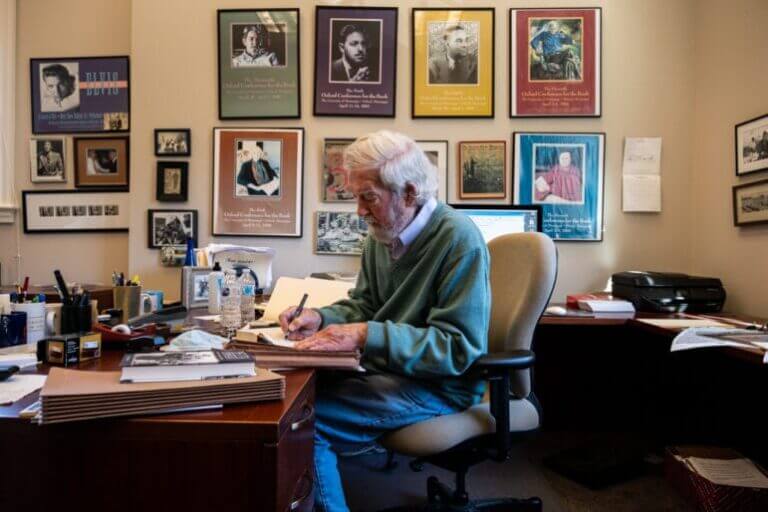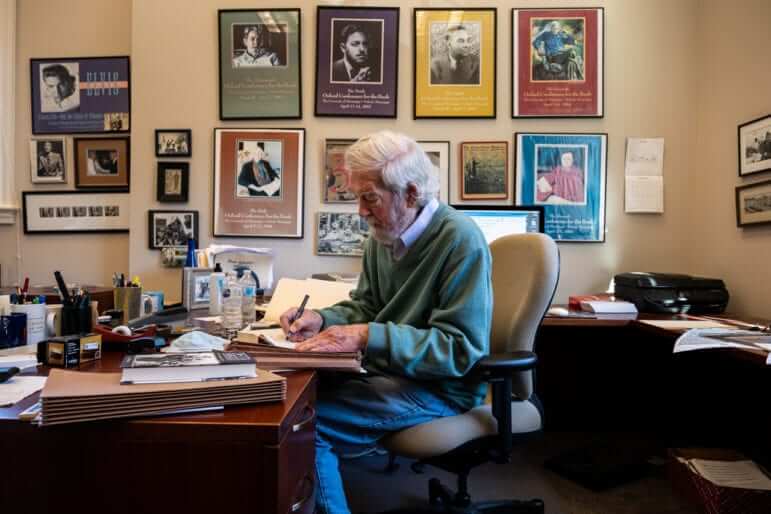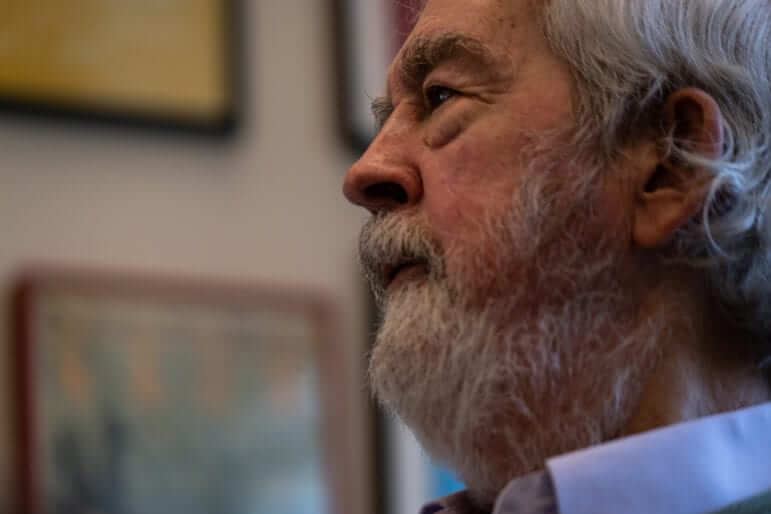

Billy Schuerman/The Daily Mississippian
After a long journalism career and 18 years of teaching, Curtis Wilkie is retiring from the University of Mississippi. (Photo by Billy Schuerman/The Daily Mississippian.)
OXFORD — Prominent political writer Curtis Wilkie had planned to “ride off quietly into the sunset” after retiring this month from his post as Fellow at the Overby Center for Southern Journalism and Politics at the University of Mississippi, but his students and colleagues couldn’t send him off without at least a little fanfare.
While Wilkie may have renounced his title as a Southerner in his early years, he soon became one of the definitive voices of storytelling in the South; his students and colleagues knew that after 18 years of teaching, his stepping down as professor marked the end of an era.
On the morning of his last class, Wilkie’s students surprised him with cookies, milk, silver party hats, and a cookie cake that read “Congratulations Curtis!” in red and blue icing. Jokingly asking if the party hat was a dunce cap, Wilkie fumbled getting the hat over his face shield and laughed at his appearance on the Zoom call once it was securely on his head.
Today, Curtis Wilkie taught his final class as an Ole Miss professor and was honored by his students with a surprise retirement party. After retiring from an illustrious reporting career, he spent 19 years imparting invaluable wisdom and skills upon our students. pic.twitter.com/BMQNFmRkiZ
— UM School of Journalism and New Media (@umjourimc) November 17, 2020
As Wilkie passed out final papers, he asked the students for the final thoughts about the 2020 Presidential Election season, the topic of this class. Students made comments about the recount in Georgia and President Trump’s legal challenges, and Wilkie snuck in a story about running into Joe Biden at the 2000 RNC convention and Biden asking to come visit the Grove on a gameday. Long after he had officially dismissed the class, students lingered to hear him tell stories one last time about covering the civil rights movement in Mississippi, including the day James Meredith was shot and interviewing Martin Luther King Jr. just weeks before he died.
A 1963 UM grad, Wilkie worked as a journalist for nearly four decades, starting out as a reporter for the Clarksdale Press Register before working as a White House correspondent for the Boston Globe and later founding the Globe’s Middle Eastern Bureau. He decided to retire from professional journalism in the late 1990s through a confluence of factors, including his eligibility for his pension, the buyout of The Boston Globe by The New York Times, and his desire not to have to travel as much. He has often joked that he decided to try teaching because he didn’t play golf and he needed something to do, but he also said that he’s been grateful to find a second career that he enjoyed so much.
“I don’t consider myself an academic at all, I’m just an old journalist who got recruited to teach and enjoys it,” Wilkie said.
Wilkie describes his teaching style as “ad-hoc” with a chuckle. His courses frequently rely on a discussion of current events, meaning that he prepares each week but has never been able to reuse a lecture.
“Many of my courses are kinda oddballs anyway because many of them, particularly ones with the Honors College, have been courses that we just invented,” Wilkie said. Those “invented” courses have included the Presidency and the Press, Political Pundits and the Presidential Election, Presidential Debates, and Journalism’s Trump Problem.
Devna Bose, a reporter for the Charlotte Observer and 2019 UM graduate, has never forgotten how Wilkie introduced himself on the first day of the Presidential Debates class she took with him. “You can all call me Curtis. I barely got my bachelor’s degree, so don’t call me doctor. And you” — looking at his grandson Davis McCool, who was also taking the class — “you can call me PopPop.”
Bose recalled how easily Wilkie commanded respect in the classroom.
“He’s such a dynamic person…such an unassuming character,” Bose said. “He’s this soft-spoken, sweet, sweet man and it’s shocking as a student to realize how much he’s accomplished in the industry.”
Bose said she didn’t learn to appreciate being from Mississippi until her later years of college, and that shift happened in large part because of professors like Wilkie. “The way he has loved (Mississippi) has taught me to love it better,” Bose said.
Adam Ganucheau, the editor-in-chief of Mississippi Today and a 2014 UM graduate, said that at times he’s struggled with whether or not it was worth it to be a journalist, and it was the encouragement of Wilkie that kept him in the field.
“I’d written a story that a lot of Republicans were coming after me for, calling me out by name…and he said, ‘You have to remember that you live in a state where Republicans pretty much rule the roost. Your job as a journalist is to hold powerful people to account, and in Mississippi, there aren’t a lot of Democrats to hold to account because there aren’t a lot of Democrats in places of power.’”
Ganucheau emphasized Wilkie’s personal dedication to the success of his students long after they graduate, telling a story of Wilkie taking Ganucheau and a source out to dinner in the Delta so that Ganucheau could get the access he needed.
“If I’ve been a good teacher, I think in part it’s because I never forgot what it was like to be a student,” Wilkie said, adding that he understood well how college could be a conflicting time in a student’s life. He himself had dropped out at one point, and flunked a class at another.
When asked what he has tried to teach young journalists, Wilkie said that credibility is everything.
“You’ve got to strive to be accurate and honest and fair in your reporting, because if you’re not, people are going to quickly realize it and they’re not going to trust you, and your usefulness as a journalist is finished.”
Wilkie frequently brought influential and well-respected industry leaders to his classes over the years, which he feels is an important part of the experience he brings. Some of his guests over the years have included Janet H. Brown, Richard Ford, Tom Brokaw, Andy Lack, and Paige Williams.
“There’s nothing like practical experience — I think that’s what I was able to bring to [the journalism department],” he said. “But I’m certainly not the only one.”
Wilkie’s second act also afforded him the opportunity to write, something he plans to continue. He is the author of four books, Arkansas Mischief, Dixie, Road to Camelot, and The Fall of the House of Zeus plus a collection of his reported essays, Assassins, Eccentrics, Politicians, and Other Persons of Interest. His latest book, When Evil Lived in Laurel, about an FBI informant who helped to bring down the KKK chapter responsible for a brutal civil rights–era killing in Mississippi, will be published next year.
“I didn’t think I’d ever write a book,” Wilkie said. “I was up in Memphis on assignment and got a phone call at my hotel from a nice lady who was a literary agent wanting to know if I would be interested in co-writing a book (with Jim McDougal, a friend of the Clintons and co-founder of Whitewater Development Corporation.) I said ‘Not really, I’ve got a real job, and besides, I think Jim McDougal’s a bit of a kook.’ And she was very charming and kept me on the phone, finally told me how much money was involved and I said ‘Well, you know, suddenly this Jim McDougal sounds like a very interesting character.’”
Wilkie discovered that McDougal was funny, a good raconteur, and honest about his guilt in the Whitewater scandal. Wilkie and McDougal wrote Arkansas Mischief and Deborah Grosvenor, the “nice lady” who made the initial call, became Wilkie’s literary agent.
The Fall of the House of Zeus, about the downfall of trial lawyer Dickie Scruggs, was a project born of Wilkie’s curiosity and frustration.
“Dick was a friend of mine, I knew so many people involved, and I found myself asking ‘What is going on in this crazy case?’” Wilkie said. “I wasn’t finding the answers from the newspaper stories, so I said to myself, ‘Goddammit, I’ll put on my reportorial hat and find out myself and write a book.’”
Wilkie said that it was easier than he thought to transition into writing books. Having written 5,000-word features regularly for the Boston Globe Magazine, Wilkie approached a book as 20 magazine stories. The process of compiling endnotes, instead of using in-text attribution, did prove to be more laborious than anticipated, but he particularly enjoyed the transition to writing in a third-person narrative style.
His experience writing magazine stories made Wilkie an excellent candidate to teach feature writing, a course that has cemented his relationship with many students.
Laura Santhanam, a PBS NewsHour reporter and 2005 UM graduate, says she can still always hear Wilkie’s voice in the back of her head telling her to “keep an eye for compelling details.” Santhanam said that Wilkie approaches teaching and writing with a humility that makes him accessible in spite of the awe-inspiring experiences he’s had.
“(Wilkie) has been such a reliable and resourceful and dedicated pair of eyes on the most powerful people this country has produced for several presidencies,” Santhanam said.
Steven Godfrey, a writer for Banner Society and 2005 UM grad, said that “He may not be as famous as some TV personalities, but he’s your favorite journalist’s favorite journalist, and he would die if he heard me saying this right now.”
“He instantly had so much credibility and gravitas, so much acumen, that he commanded the respect of the room, but he also did it with total benevolence,” said Godfrey. Godfrey said that he and his peers sought Wilkie’s approval so much more than Wilkie realized.
In Godfrey’s eyes, Wilkie embodies fearlessness in the face of authority. “If you go through his work, you see a human being who is able to balance his love of place (Mississippi) with his absolutely uncompromising assessment of its negativities…Mississippi is a hard place to be fearless. You can’t sneeze in Mississippi without everyone finding out.”
The retirement celebrations have made Wilkie smile, but he said it’s also been a little embarrassing to have so much attention paid to him because he doesn’t believe he deserves any particular acclaim.
“(The celebrations and interviews) reek like I’m craving publicity, and that’s never been my style,” Wilkie said.

Billy Schuerman/The Daily Mississippian
After a long journalism career and 18 years of teaching, Curtis Wilkie is retiring from the University of Mississippi. (Photo by Billy Schuerman/The Daily Mississippian.)
Wilkie knew it was time to retire even before the coronavirus pandemic, realizing that he would be 80 this year. “Once you hit 80, it’s time to get out before you start embarrassing yourself,” he said, joking that he didn’t want spittle hitting students in the front row when he lectured.
Ganucheau said he has had mixed emotions about Wilkie’s retirement.
“The way that he cared for his students and not only sought to get them and keep them interested in journalism, but to help them through the problems…he has this generation of young minds that he has shaped,” he said. “I’m so happy for him and it’s a really great end to this crazy, long, storied career, but I also know that there’s going to be a lot of students who miss out on that (mentorship experience).”
When describing the relationship between his professional experience and his teaching style, Wilkie quoted a favorite line and then immediately kicked himself for not remembering the name of the author (it was from Ulysses, by Alfred Lord Tennyson): “I am a part of all that I have met.”
Editor’s note: Julia James, a senior at the University of Mississippi, originally reported this story for a class at the UM School of Journalism and New Media. Curtis Wilkie has participated in events sponsored by Mississippi Today. Dickie Scruggs, mentioned in the article, is a donor to Mississippi Today.
The post A finale to Curtis Wilkie’s final act: Esteemed Mississippi journalist retires from teaching appeared first on Mississippi Today.
- Q&A: Explaining the health care coverage gap - April 18, 2024
- The unlikely Mississippi politician who could tank Medicaid expansion - April 18, 2024
- Brother wants answers after body pulled from Pearl River IDed as missing Jackson man - April 18, 2024